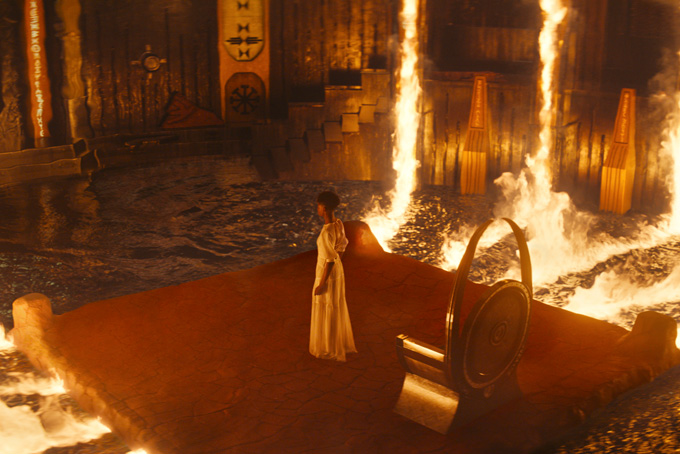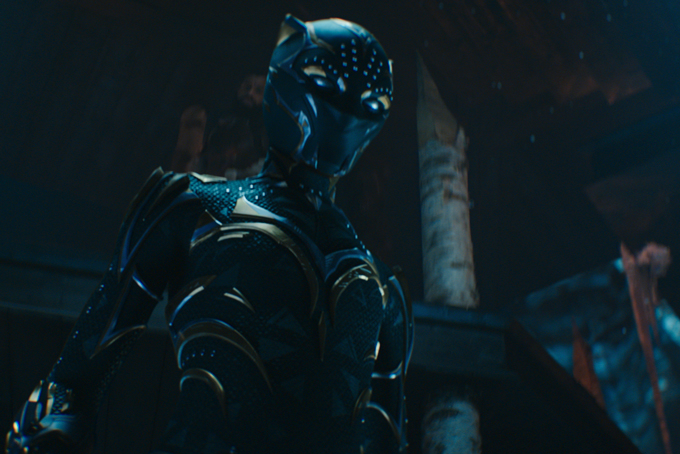Spoiler alert: This story contains spoilers of Black Panther: Wakanda Forever.
Ryan Coogler handles his grief like a poet. He mulls over it, questions the made-up lines of reality and tastes his tears. And he pours it all into his characters for Black Panther: Wakanda Forever. Four years after the release of Marvel’s prolific hit in 2018, Black Panther, the phenomenal sequel brings with it a beautifully poignant acceptance of the unexpected passing of its leading star back in 2020, Chadwick Boseman. Yet don’t get us wrong; whilst Boseman’s death may loom over the film, the 161-minute picture still strays far from being a heavy-handed tale of tragedy.
Like the raising of curtains right after a play’s intermission, the film’s opening is instantly chaotic—as if hastily choreographed to reflect real-life happenings. Princess Shuri (Letitia Wright) is struggling to accept what is happening to her brother, Wakanda’s beloved T’Challa, who is dying from an unknown illness. She paces uneasily around her lab to find a solution of science, rather than choosing to be by his side, only to be met with the unwilling news that she’s already too late. From here on out, it’s clear that Shuri allows this frustration and denial to wash over her—leading her to make some of the unseemly choices that she makes throughout the film. And yet; Wright’s delivery is so palpable that should you lean in a little closer, you just might catch glimpses of yourself in her.
But whilst Shuri feels the loss on an intensely personal level, the loss of Wakanda’s king and the Black Panther allows a growing impression of Wakanda to breed in the minds of other scheming politicians: as a weakening power which can be threatened for its precious (and deadly) vibranium resource. Its allusions to colonialism are clear and here, the film wastes no time in reminding us about the original prowess of its predecessor. The room of politicians is swiftly nipped in the bud by Queen Ramonda (Angela Bassett) and the entrance of the Dora Milaje led by Danai Gurira’s fierce Okoye—the all-female army of Wakanda. It’s visually rich with cinematic tells; the vibrant costuming of the Wakandans towers over the dull, defeated suits and military wear of the ones seated (or even kneeling) in the room. An empowering reminder of the cultural strength of its people, and of its women.

And this reminder becomes two-fold in the film: the very fabric of Wakanda that celebrates its rich cultural heritage and centres it at its core is challenged by their seeming nemesis—the king of Talokan. Known as Namor (Tenoch Huerta Mejía), he’s written like the stuff of mythical legends: with wings on his ankles and ears of an elf. But he presents a very real threat to the narrative of Wakanda: his entire underwater kingdom also runs on vibranium, a resource that had previously only been known to belong to Wakanda. He grows desperate to prevent the ‘colonisers’ from discovering the entirety of Talokan, as they crawl into deep waters to search for other sources of the rare metal.
Talokan takes pride in its ancestry and culture—a clear parallel to Wakanda—being descendants of a Meso-American tribe living on the shores of the waters that they now inhabit. As the film progresses, he engages in both tyrannical negotiations and uneasy declarations of war, but not without the occasional flash of understanding in his eyes for what he is willing Shuri and Queen Ramonda to do. By pitting these cultures against one another, Coogler demonstrates another exposition of grief: an irreparable loss for the multiple generations of those that had been colonised. It’s an almost unsettling thing to have to witness, forcing us to see the trauma that had been enacted once upon a time—hinting at who really drowns beneath the surface.

But above the surface, it makes sense. Both ends are struggling with losses that make them see red; a rage waiting to erupt from within. Which the film willingly gives in to—almost like purposeful moments put aside for exclaiming their sorrow. Whilst Shuri’s rage is pointed and decisive, Queen Ramonda’s state of desolation is immediately felt at the film’s midway mark: her voice booming with despair from the throne. Namor, on the other hand, takes loss in a menacing, almost vengeful stride. But on the other side—Nakia (Lupita Nyong’o)—has dealt with her anguish in isolation, poised as a voice of reason instead.
Without any spoilers, the film’s ending seems to understand exactly what sort of resolution all parties must come to—despite the clear sentiment of grief that binds them. And it’s one that is peppered throughout the film: the soft moments of laughter that contrast the tears, the shared banter between Michela Coel’s upbeat Aneka and Okoye, the humorous jabs thrown in the direction of C.I.A agent Everett Ross (Martin Freeman). That even in the dooming depths of loss, a balance can and must eventually be found, as conflicting as it may be inwardly. Coogler honours the strength and loss of Boseman by rendering his film with the palpable absence of its beloved T’Challa, whilst remembering all of his nobility, kindness and heart at the same time. He reminds us all again of what the Black Panther has always needed to be: an embodiment of cultural pride, a harbinger of hope and protection, and yet, undeniably human.






